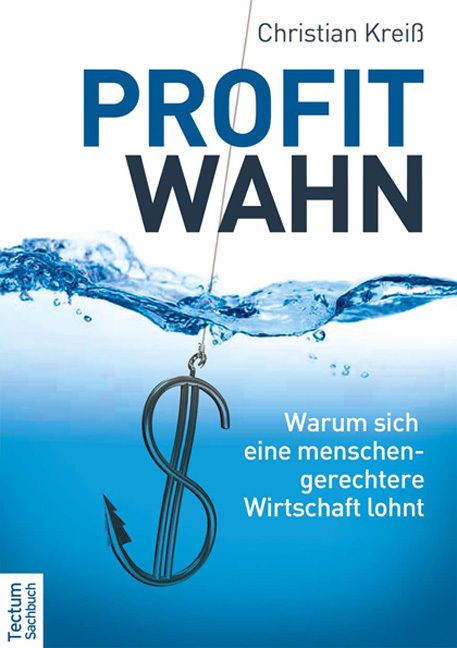“We are heading for a major clean–up crisis”
Interview by ÖkologiePolitik with Professor Christian Kreiß*
The COVID pandemic and the Ukraine war show how fragile our economy is. The real problem, however, is not global supply chains, but the compulsion to grow and excessive debt, says an economics professor. Because both cannot be increased endlessly, a big crash is looming.
ÖkologiePolitik: Professor Kreiß, what influence does our financial system have on the common good?
Christian Kreiß: A very great influence. Listed stock corporations are constantly driven to generate ever higher profits, otherwise the share price falls and the company is in danger of being taken over. Driving up profits is almost always at the expense of the environment, because it is usually available for free. Furthermore, as much as possible is extracted from the workforce. The term “human resources”, as many personnel departments call themselves today, says it all: a non–word that expresses that working people should be treated like mines. Our financial system is responsible for most of the damage to the common good through the forced implementation of the principle of profit maximisation. It ensures a structurally increasing inequality of distribution, because the profits flow for the most part without benefits to the relatively small group of owners of company shares, land and money securities. In essence, our financial system serves the interests of the rich, not the general public and certainly not the needs of animals or an intact nature.
Is our current financial system resilient?
No. All institutions – banks, insurance companies, stock exchanges – basically work according to their individual profit maximisation. Although there are national banking-, stock exchange- and insurance supervisors and the BIS (Bank for International Settlements) in Basel, which prescribes international regulations, they have not prevented the world debt level, including financial companies, from exceeding 350 % of the world’s social product today. Without financial companies it is about 250 % – in 1970 it was 100 %. This mountain of debt can probably not be repaid in full. The system is based on the creditors’ illusion that their claims are still fully recoverable. But they have not been for a long time, because they are no longer backed by the real economy nearly as much as they were, say, in 1970. This illusion can quickly burst, as past financial crises have shown: for example, in September 2008 after the Lehman bankruptcy, the Asian financial crisis at the end of the 1990s or the global stock market and financial crisis from 1929 onwards. A look at history shows that our financial system is anything but resilient. And today it is worse than ever. There has never been such a mountain of debt and such an overhang of money – the US Federal Reserve has increased the central bank money supply by a factor of eleven since 2008, the ECB by a factor of nine. This is dangerous. We are dancing on a volcano. And we are probably heading for a major purge crisis.
What could that look like?
There could either be several years of double-digit inflation – which I don’t think will happen, because the US Federal Reserve is currently breaking inflation in the US with success. Or there will be – and I think this is much more likely – a financial and economic crash: with rising interest rates, a great many companies worldwide with too much debt are likely to go bankrupt. In addition, there are more than 60 countries worldwide that will probably no longer be able to service their debts: not only developing countries, but also Italy, Greece or Japan, for example. Such a wave of bankruptcies is likely to trigger a financial and banking crisis and thus a severe economic downturn or an economic depression with very high unemployment, similar to 1929 to 1932. A third solution would be war: The escalation of the Ukraine war into a NATO war could also enable a “reset” as in 1945 via destruction processes – with all the horror that goes with it. A big war can solve the economic problems. Especially countries whose territories are not affected by such a war would benefit from such a solution and could therefore strive for it.
What are the causes of this vulnerability to crises?
The main cause is the compulsion for growth through the monetary, debt and stock market system. Our debt-money system forces growth. Without growth, you can’t pay back the interest. The stock markets force growth, otherwise profits cannot be increased. Furthermore, our textbooks and economics professors preach gluttony, selfishness and growth. This steers us every two to three generations into an over–indebtedness system, which – if you look at history – is usually solved with financial crises or with wars.
What measures could make our financial system more resilient?
Banks and insurance companies on a cooperative or public-law basis could be strongly favoured in terms of taxation, and in return large listed financial companies could be imposed with a levy or additional tax. This would allow us to shift most of the financial sector back to smaller, locally active institutions over perhaps two generations, along the lines of the Raiffeisen banks and savings banks. Money creation and monetary policy could be determined by consensus and discourse by cooperative bank and savings bank representatives, because they know best what local customers need. The futures markets should be severely restricted, e.g., via a strong transaction tax. The main driver of the ever-growing mountains of debt and money is the greedy predatory culture that constantly demands high returns for the benefit of a small layer of wealthy people. One could therefore consider a progressive wealth tax starting at perhaps two million euros per natural person. Especially in the case of land ownership, this could be done immediately without any problems, since land cannot migrate abroad. By shifting financial transactions back to small, decentralised institutions, a transaction tax and a progressive wealth tax, the main drivers of excesses in the financial markets would largely disappear and thus the financial system as a whole would become much more resilient.
Professor Kreiß, thank you very much for the interesting interview. •
Source: https://www.oekologiepolitik.de/wp-content/uploads/2022/12/OeP190_Online.pdf
(Translation Current Concerns)
* Professor Dr Christian Kreiß, born in 1962, studied economics and did his doctorate on the Great Depression 1929–1932. He then worked professionally for nine years in various commercial banks, seven of them as an investment banker. Since 2002, he has taught finance and economic policy as a professor at the Aalen University of Applied Sciences. He has published several books in which he criticises neoliberal economic theory and warns of its environmental and socio-political consequences. His books include “Profitwahn. Warum sich eine menschengerechtere Wirtschaft lohnt” (Profit mania. Why a more humane economy is worthwhile), Tectum, 2013, and “Das Mephisto-Prinzip in unserer Wirtschaft” (The Mephisto principle in our economy), Tredition, 2019.
War to solve economic problems?
“Before the First World War, there was a similar economic imbalance as today: an overcapacity. Purchasing power was too low to sell all the products. The First World War destroyed production capacities in Europe. The Second World War did the same. After that, there was a short phase of underproduction and then a long phase of equilibrium. Today we have overcapacities again. Since the 1980s, mass consumption has actually not been able to keep up with the increase in production due to the increasing inequality of wealth – and has therefore been artificially boosted by more and more new debts. But growing mountains of debt are not a sustainable solution strategy, as this development cannot be maintained in the long term. [...] For those who are directly affected by it, war is of course always a disaster. But not for those who are not directly affected. Especially not if they benefit from it. During the Second World War, for example, first the arms industry flourished in the USA and then subsequently the rest of the economy. We are experiencing something similar again right now: not despite, but because of the Ukraine war, certain industries and corporations are celebrating record profits. And indirectly, certain national economies are also profiting from this.”
Source: “Krieg um ökonomische Probleme zu lösen?” (War to solve economic problems?)
Interview by ÖkologiePolitik with Professor Dr Christian Kreiß
(Translation Current Concerns)


